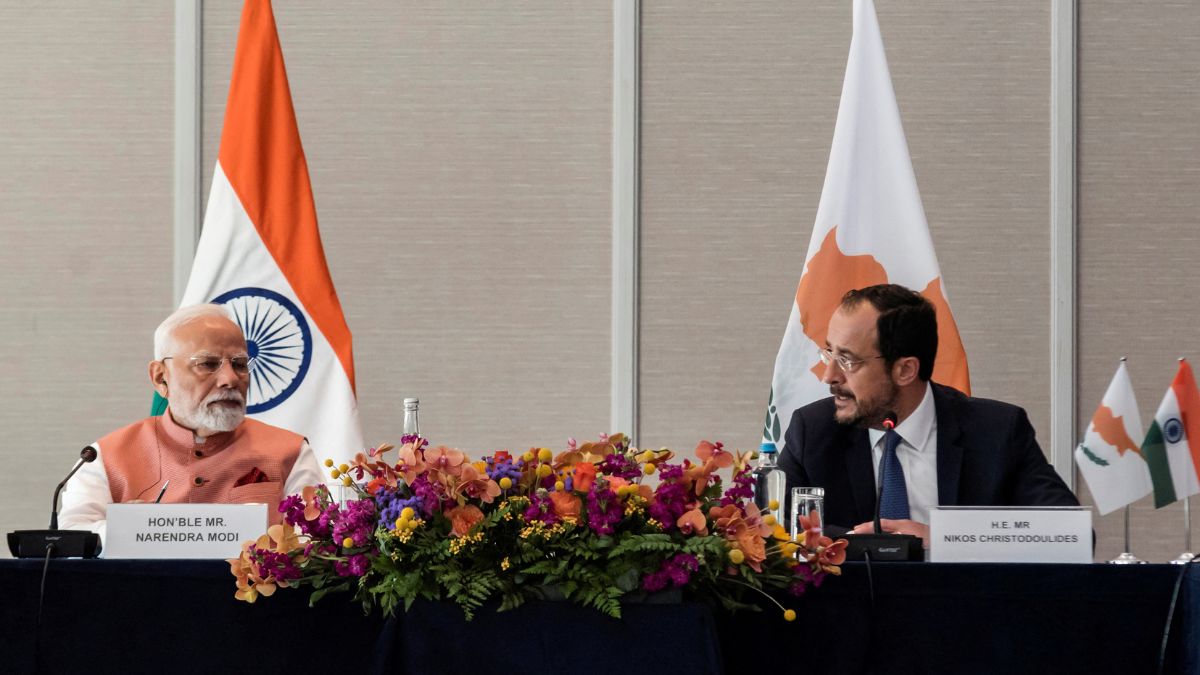Prime Minister Narendra Modi’s two-day stop in Cyprus from June 15–16, marked the first Indian prime ministerial visit to the Mediterranean island in more than two decades.
The visit was part of a broader three-nation tour, also covering Canada for the G7 Summit and Croatia.
Modi’s arrival in Cyprus coincided with heightened tensions in West Asia. As the airspace in Israel, Iran and briefly Lebanon were shut, it necessitated a modified flight path for his official aircraft — traversing the Arabian Sea, Somalia, Ethiopia, Eritrea and Egypt — before landing on the island.
The timing and destination were far from symbolic. Cyprus has emerged as a key component in India’s regional strategy, especially as New Delhi seeks to recalibrate its relationships in the Mediterranean and Europe.
The visit also occurred shortly after Operation Sindoor and is widely interpreted as a pointed diplomatic signal to Turkey, which has aligned itself with Pakistan, particularly in multilateral fora and during recent regional skirmishes.
Turkey-supplied drones used in attacks on India have only increased New Delhi’s concerns, and resulted in deeper engagement with Cyprus — and by extension Greece — is being viewed as a strategic counterbalance.
How India has been batting for Cyprus for decades
Located in the eastern Mediterranean Sea, Cyprus boasts a population of only 1.3 million. The island nation, which gained independence from British rule in 1960, soon saw tensions erupt between its two main communities — Greek Cypriots and Turkish Cypriots.
Power-sharing arrangements collapsed just three years later, prompting the deployment of a United Nations peacekeeping force in 1964.
A decade later, in 1974, a coup backed by the Greek military junta aimed to unify Cyprus with Greece. In response, Turkey launched a military invasion, citing the protection of Turkish Cypriots.
Although the legitimate government in Nicosia was subsequently restored, Turkish forces remained in the northeastern part of the island. That region later declared itself the “Turkish Republic of Northern Cyprus” — a political entity recognised solely by Ankara.
This ongoing division remains unresolved, with Turkey continuing to station troops in the north despite United Nations resolutions calling for a reunified island under a bi-zonal, bi-communal federation.
India has consistently supported a resolution to the Cyprus issue based on international law, UN resolutions and EU principles. It continues to advocate for a bi-zonal, bi-communal federation as the legitimate political solution for the divided island.
New Delhi’s contribution to the United Nations Peacekeeping Force in Cyprus (UNFICYP) has also been noteworthy, with three Indian officers — Lieutenant General PS Gyani, Major General Diwan Prem Chand and General KS Thimayya — having served as Force Commanders.
Thimayya, who passed away during his service in Cyprus, is commemorated locally with a street named in his honour and a postage stamp issued in 1966. As of mid-2025, one Indian Army officer continues to serve in the UN peacekeeping force.
Cyprus, in turn, has stood firm in its support of India’s international aspirations.
The island republic has publicly endorsed India’s bid for a permanent seat on an expanded United Nations Security Council, as well as supported the India-US Civil Nuclear Agreement within global regulatory institutions such as the Nuclear Suppliers Group (NSG) and the International Atomic Energy Agency (IAEA).
How India and Cyprus are expanding economic collaboration
The bilateral engagement between the two nations received a major boost during the business roundtable hosted in Limassol, where both Modi and Cypriot President Nikos Christodoulides were present to witness the signing of multiple Memoranda of Understanding between Indian and Cypriot businesses.
Welcome to Cyprus Prime Minister @narendramodi!
— NikosChristodoulides (@Christodulides) June 15, 2025
Here, at the EU’s southeastern frontier and gateway of the Mediteranean
A historic visit
A new chapter in a strategic partnership that knows no limits
We make a promise to advance, transform, prosper more. Together
🇨🇾🇮🇳🇪🇺 pic.twitter.com/jXex0jnts9
Agreements were formalised between the National Stock Exchange International Exchange (based in GIFT City, Gujarat) and the Cyprus Stock Exchange.
A further milestone was achieved when NPCI International Payments Limited (NIPL) and Eurobank Cyprus agreed to enable India’s Unified Payments Interface (UPI) in Cyprus, facilitating seamless cross-border payments for tourists and businesses alike.
In his remarks at the forum, Modi highlighted Cyprus’s emerging role as an economic partner for India, particularly in Foreign Direct Investment.
He welcomed the growing interest among Cypriot companies in engaging with India’s expanding economy and pointed out the strong potential in financial services.
Eurobank Ergasias CEO Fokion C Karavias told ANI, “We are very excited with the visit of Prime Minister Narendra Modi here in Cyprus. This is an excellent opportunity to promote further business between the two countries… Cyprus offers a number of opportunities for Indian companies… we have also signed an MoU with National Payments Corporation of India (NPCI) to bring UPI payments to Cyprus and also to Greece. So overall we believe there is plenty of opportunity for business.”
The launch of the India–Greece–Cyprus (IGC) Business and Investment Council aimed to catalyse trilateral collaboration in shipping, logistics, aviation, renewable energy and digital services.
Cyprus is also seen as a European base for many Indian enterprises in IT services, financial consultancy, and tourism.
According to trade figures, bilateral commerce between India and Cyprus amounted to $136.96 million in the 2023–2024 fiscal year. India primarily exports pharmaceuticals, ceramic goods, iron and steel, textiles, chemicals, and machinery.
Cyprus, in turn, exports pharmaceuticals, beverages, and manufactured products. Trade levels were impacted during the COVID-19 pandemic but are now steadily recovering.
Cyprus remains one of the largest sources of FDI into India due to a favourable investment climate supported by a revised Double Taxation Avoidance Agreement (DTAA), signed in 2016.
The revised DTAA incorporates OECD standards on capital gains taxation and safeguards against base erosion and profit shifting. Cyprus is one of the few countries outside the FATF framework to receive India’s Category-I Foreign Portfolio Investor status.
Why Cyprus is crucial to India’s EU outreach
Cyprus’s geographic location in the Eastern Mediterranean lends it a vital role in India’s broader infrastructure and trade ambitions.
As New Delhi champions the India-Middle East-Europe Economic Corridor (IMEC), Cyprus is seen as a natural logistical node along the route connecting Indian ports to European markets via the Middle East.
The Eastern Mediterranean is also home to significant offshore energy resources, and Cyprus plays a prominent role in regional gas exploration efforts.
This strategic interest aligns with India’s aim to diversify its energy imports. Modi’s visit explored ways to deepen energy cooperation, especially in light of mounting regional frictions over maritime resource claims, primarily involving Turkey.
Cyprus’s forthcoming presidency of the Council of the European Union in the first half of 2026 is another compelling reason for India to fortify relations.
A strong partnership with Nicosia can support India’s ambitions in securing broader economic agreements with the EU, including the proposed India-EU Free Trade Agreement, which both sides hope to conclude by the end of 2025.
Invest Cyprus Chairman Evgenios Evgeniou described the visit as transformational, telling ANI, “Today is a great day for us in Cyprus, a great honor to have welcomed Prime Minister Modi and we truly look forward that his visit will add a lot of momentum to the economic, business and investment relations between India and Cyprus…PM Modi’s visit will add momentum to this strong bilateral relationship for the benefit of India, Cyprus and the European Union…”
What next for India-Cyprus relations?
Defence collaboration has steadily advanced since the signing of a Memorandum of Understanding on Defence Cooperation in December 2022.
Building on this, both countries concluded a Bilateral Defence Cooperation Programme (BDCP) for 2025 in Nicosia. The Indian Defence Attaché to Cyprus is currently based at the Indian Embassy in Cairo and oversees coordination.
According to the Ministry of External Affairs (MEA), there are over 11,000 Indian nationals residing in Cyprus, most of whom work in sectors such as shipping, information technology, financial technology, agriculture, household services and higher education.
In recognition of this growing people-to-people connection, Startup India and Invest Cyprus are also exploring a structured partnership to create a bilateral startup bridge.
Modi’s outreach to Cyprus also serves as a message to Europe that India seeks a concrete partnership — one that can offer New Delhi greater diplomatic leverage going forward, particularly as it positions itself as a leading voice of the Global South on the world stage.


)
)
)
)
)
)
)
)
)



